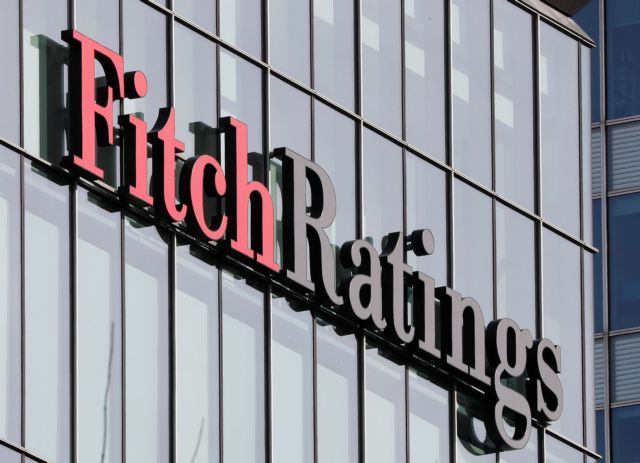
The announcement of the European Central Bank that it can buy Greek government bonds until the end of 2024 reduces the risk of a sharp increase in borrowing costs as the pandemic emergency purchase program (PEPP) expires, according to Fitch Ratings.
The agency also emphasizes that the next scheduled review of Greece’s credit rating ‘BB’ / Stable is on January 14th. “Greater confidence in government debt / GDP returning to a steady decline after the Covid-19 shock, continued improvement in asset quality in systemically important banks and better medium-term growth potential and performance could lead to positive action for evaluation,” it underscored.
The international rating agency said the ECB on Thursday confirmed that PEPP net asset purchases would stop by the end of March 2022, but extended the bond reinvestment period, which was set to expire, by one year until the end of 2024.
The ECB also said that during possible market pressures related to the pandemic, PEPP reinvestments “can be flexibly adjusted over time”, including the Greek bond market.
According to Fitch, PEPP has been an important source of funding flexibility for Greece, whose government bonds are not eligible for other ECB market programs due to the fact that it is out of investment grade.
By the end of November, the ECB had purchased € 34.9 billion (19.3% of projected GDP 2021) of Greek government bonds, close to the amount provided by the PEPP of € 1.85 trillion and 2% of capital of Greece to the ECB.
The report emphasizes that the PEPP markets contributed to the maintenance of the marginal interest rates of the Greek debt, with the 10-year yield falling to about 1.3% from over 2% in May 2020.
Liquidity
Other factors also support the sustainability of public debt. Greece’s significant liquidity reserve is projected to be close to 18% of GDP at the end of the year, which would cover the international rating agency’s debt service estimate in 2022. “The favorable nature of most debts means that the average service cost it is low (in absolute numbers and in relation to peer ratings) and the amortization programs are manageable “he emphasizes.
In addition, the Greek authorities managed the amortization schedule as a precaution.
Fitch estimates that a recent liability management exercise reduced depreciation for the period 2023–2025 by approximately € 1.1 billion (0.5% of projected GDP 2023).
The average maturity of the Greek debt is one of the highest in each country, at about 19 years. Press reports state that Greece will repay its outstanding loans from the IMF next year (approximately 1.85 billion euros). “We had previously estimated that a large, permanent increase in market interest rates would increase the debt ratio, but only by about 4.5 percentage points over five years,” the report said.
Despite these mitigations, Greece’s very high public debt is an inability to assess. We estimate that public debt to GDP in 2021 fell from the 2020 ceiling of 206.3% of GDP to 197.3 %% – it is still the third highest among government states with a Fitch rating.
Forecasts for the economy
Lower deficits and steady economic growth will support debt reduction. We forecast real GDP growth of 8.3% this year and expect the recovery to continue in 2022 as the next generation of EU capital recovery accelerates and increases real spending, with growth of 4.1% and 3.6% in 2022. and in 2023. But the debt index will remain high, just below 188% in 2023.
Fitch also believes that the ECB will remain flexible enough to avoid negative impacts on the financing and liquidity of Greek banks. The special terms under the third series of targeted longer-term refinancing operations (TLTRO-III, approximately 20% of sectoral funding) are scheduled to expire in June 2022, but the two-tier reserve remuneration system may be adjusted to reduce costs. funding. They also believe that the ECB could extend its waiver to include Greek public debt as repo collateral beyond June.
Greek banks
The financing and liquidity profiles of Greek banks have improved structurally in recent years, supported by a healthy increase in customer deposits and better access to the debt market. Banks have increased unsecured debt issuance to meet future consolidation requirements and will be able to increase secured interbank lending as TLTRO-III lending expires, albeit at a higher cost.
Latest News

Airbnb: Greece’s Short-Term Rentals Dip in March Amid Easter Shift
Data from analytics firm AirDNA shows that average occupancy for short-term rentals dropped to 45% in March, down from 49% the same month last year.

Easter Week in Greece: Holy Friday in Orthodoxy Today
At the Vespers service on Friday evening the image of Christ is removed from the Cross and wrapped in a white cloth

Meloni and Trump Meet in Washington, Vow to Strengthen Western Ties
“I am 100% sure there will be no problems reaching a deal on tariffs with the EU—none whatsoever,” Trump stressed.

ECB Cuts Interest Rates by 25 Basis Points in Expected Move
The ECB’s Governing Council opted to lower the deposit facility rate—the benchmark for signaling monetary policy direction—citing an updated assessment of inflation prospects, the dynamics of underlying inflation, and the strength of monetary policy transmission.

Current Account Deficit Fell by €573.2ml Feb. 2025: BoG
The improvement of Greece’s current account was mainly attributed to a more robust balance of goods and, to a lesser extent, an improved primary income account

Hellenic Food Authority Issues Food Safety Tips for Easter
Food safety tips on how to make sure your lamb has been properly inspected and your eggs stay fresh.

Greek Kiwifruit Exports Smash 200,000-Ton Mark, Setting New Record
According to data by the Association of Greek Fruit, Vegetable and Juice Exporters, Incofruit Hellas, between September 1, 2024, and April 17, 2025, kiwifruit exports increased by 14.2%.

Easter Tourism Boom: Greece Sees 18.3% Surge in Hotel Bookings
Among foreign markets, Israel has emerged as the biggest growth driver, with hotel bookings more than doubling—up 178.5% year-on-year.

Greece to Launch Fast-Track Tender for Offshore Hydrocarbon Exploration
Last week, Papastavrou signed the acceptance of interest for the two Cretan blocks, while similar decisions regarding the two Ionian Sea blocks were signed by his predecessor

American-Hellenic Chamber of Commerce to Open Washington D.C. Branch
AmCham's new office aims aims to deepen U.S.-Greece economic ties and promote investment and innovation between the two countries







![Πλημμύρες: Σημειώθηκαν σε επίπεδα ρεκόρ στην Ευρώπη το 2024 [γράφημα]](https://www.ot.gr/wp-content/uploads/2025/04/FLOOD_HUNGRY-90x90.jpg)




![Airbnb: Πτωτικά κινήθηκε η ζήτηση τον Μάρτιο – Τι δείχνουν τα στοιχεία [γράφημα]](https://www.ot.gr/wp-content/uploads/2024/07/airbnb-gba8e58468_1280-1-90x90.jpg)

























![Airbnb: Πτωτικά κινήθηκε η ζήτηση τον Μάρτιο – Τι δείχνουν τα στοιχεία [γράφημα]](https://www.ot.gr/wp-content/uploads/2024/07/airbnb-gba8e58468_1280-1-600x500.jpg)


 Αριθμός Πιστοποίησης
Αριθμός Πιστοποίησης